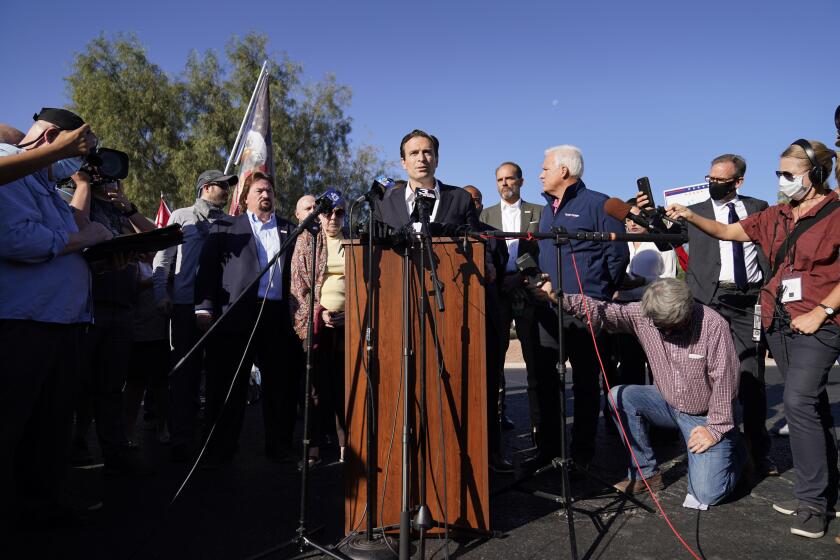Column: Trump will leave, but his toxic politics are here to stay

Losing a presidential election isn’t easy for any candidate to absorb.
“There are times when all I want to do is scream into a pillow,” Hillary Clinton wrote after losing to Donald Trump in 2016.
“It keeps you awake at night,” the normally stoic Bob Dole confessed after his loss in 1996.
Massive vote fraud? No. Nevada is sending one possible case to investigators as Republicans come up mostly empty in attempt to undermine Biden’s win.
Walter F. Mondale, who lost in 1984, asked George S. McGovern, who lost in 1972, how long it takes to get over. “I’ll let you know when it happens,” McGovern replied.
At least they all conceded.
More than a week after election day, Trump is still refusing to accept the simple arithmetic of the electoral vote: He lost to Joe Biden.
Instead of accepting defeat, the president is charging fraud, even though his lawyers have failed to produce any evidence of significant errors.
“WE WILL WIN!” Trump tweeted Tuesday. “RESULTS START TO COME IN NEXT WEEK.” It wasn’t clear what new results he had in mind.
When Trump first claimed the election was still open, it was briefly plausible that he was doing what any loser in a close election might do: looking for a legal path to challenge the results.
But that’s less and less plausible every day. In the words of Georgia’s Republican elections chief, claims of fraud have turned out to be “hoaxes and nonsense.”
Besides, Trump is losing by too big of a margin for his challenges to make a difference. If current counts stand, he’ll lose the electoral vote 306 to 232. When he won by that same tally on election day four years ago, he called it “a landslide.”
To reverse the outcome, Trump would need to flip the results in at least three states. But he’s behind by about 147,000 votes in Michigan, 46,000 in Pennsylvania and 37,000 in Nevada, the three states where his supporters have filed lawsuits — margins far too big to erase.
So why is he persisting?
Some White House officials — the kind who insist on concealing their names when they’re quoted — have described a psychodrama in the halls of the White House, with a president who refuses to confront reality when it means he’ll wear the label he fears the most: Loser.
But Trump’s continuing claims of fraud have turned his personal meltdown into a broader political crisis.
He’s building a narrative that can serve as the foundation for a continued political career after Biden’s inauguration: the “lost cause” myth, kept alive in the hearts of his supporters, that he actually won but was cheated out of victory.
Armed with that tall tale, Trump can maintain his grip on the Republican Party from exile in Mar-a-Lago, keep raising money, and keep alive the option of running again in 2024.
Trump’s effort to overturn the election hasn’t met success in the courts. But he has sent nonstop emails and Facebook messages to his supporters, begging for funds to keep the battle going.
The fine print reveals that much of the money won’t go to legal battles at all; it’s being funneled into “Save America,” a political action committee formed on Monday to pay for Trump’s post-presidential operations.
The election-fraud narrative could give Trump a weapon to use against the New York state prosecutors who are investigating his business. If he stays active in politics, he can claim that their probes are partisan, another “witch hunt” aimed at taking him down.
Other Republicans are trying to follow the president’s lead. The two GOP candidates in Georgia’s Senate runoff have promised to pursue charges of election fraud even though Republicans ran the election there.
Other Republicans also have professed their devotion to the cause. “Do not concede, Mr. President,” Sen. Lindsey Graham of South Carolina pleaded. “Fight hard.”
This may sound like bare-knuckled politics with a Trump-era twist. But by keeping the myth of election fraud alive, the president is doing something his modern predecessors never did: He’s actively damaging his successor’s prospects of success.
White House aides have forbidden federal agencies to cooperate with Biden’s transition team, arguing that the election hasn’t been decided until every legal challenge is resolved. That’s not a major problem yet; there’s still time to organize a smooth transition.
But by declaring Biden’s election stolen, Trump is undermining his successor’s legitimacy.
In a poll conducted last week for Politico and Morning Consult, 70% of Republicans said they didn’t believe the election was free and fair, up from 35% of GOP voters who held that view before the results were announced.
Trump’s sons and his political aides have warned other Republicans that any move to recognize Biden as the winner will be considered an act of disloyalty to the party.
That makes it more difficult for other Republicans to cooperate with the incoming Biden administration, despite the president-elect’s professed intention to seek bipartisan accord.
This is not what outgoing presidents normally do.
After President George H.W. Bush lost his bid for reelection in 1992, he left a handwritten note for his successor, Bill Clinton, in the Oval Office.
“Your success now is our country’s success,” Bush wrote. “I am rooting hard for you.”
Trump is doing the opposite. He is rooting for Biden to fail.
Most presidents who have lost reelection are remembered, like Bush, for the grace with which they accepted defeat, however bitter the campaign.
Not Trump.
He will leave the White House the same way he governed: gracelessly, chaotically, putting his own interests first — and heedless of the damage he does to American democracy along the way.
More to Read
Get the L.A. Times Politics newsletter
Deeply reported insights into legislation, politics and policy from Sacramento, Washington and beyond. In your inbox three times per week.
You may occasionally receive promotional content from the Los Angeles Times.








